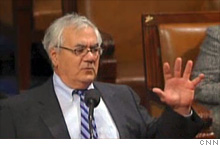Sweeping bank reform bill clears House
Measure, aimed at preventing another big financial crisis, imposes more oversight and creates consumer protection agency.
 |
| Rep. Barney Frank has shepherded the regulatory reform package along. |
WASHINGTON (CNNMoney.com) -- The House passed legislation Friday aimed at preventing the next big financial crisis, ushering in the most sweeping set of changes to the banking regulatory system since the New Deal.
The bill, which passed 223-202, imposes more oversight and stronger capital cushions for the largest banks and Wall Street firms. It forces them to pay a total of as much as $150 billion into an emergency fund that could be tapped when a troubled company needs to be taken over and broken up.
The legislation also calls for the regulation of some derivatives and creates a new Consumer Financial Protection Agency to regulate products such as credit cards and mortgages.
"We are sending a clear message to Wall Street, the party is over. Never again will reckless behavior on the part of the few threaten the fiscal stability of our people," said House Speaker Nancy Pelosi during a press conference after the bill passed. "The legislation will finally protect Main Street from the worst of Wall Street."
On the Senate side of Capitol Hill, the bill is moving much more slowly and final passage is likely months away.
As chairman of the House Financial Services committee, Rep. Barney Frank, D-Mass., has spearheaded the financial reform package since last Spring -- especially the part that creates the Consumer Protection agency.
"The bailouts of AIG and Bear Stearns would be not possible -- made illegal -- under this bill," Frank said. "If a company fails, it'll be put to death."
Overhauling the financial regulatory system has been a major priority of the Obama administration, which has been involved in almost every step of the nearly year-long process. High ranking Treasury officials visited House Speaker Pelosi's office this week, when some parts of the bill appeared in trouble.
"This legislation brings us another important step closer to necessary, comprehensive financial reform that will create clear rules of the road, consistent and systematic enforcement of those rules, and a stronger, more stable financial system with better protections for consumers and investors," President Obama said in a statement.
House Republicans have been united in their opposition, saying the bill would provide a permanent bailout of Wall Street and a step toward socialism. One of the bill's lead opponents, Rep. Jeb Hensarling, R-Texas, said it would impose "sweeping draconian powers" on private businesses.
However, over the past several months, the bill has faced its biggest hurdles among Democrats.
Conservative Democrats picked apart different sections, especially the consumer protection agency, saying they worried it would hurt small businesses.
In fact, the plan for the agency has been watered down from the version first proposed by the White House. It no longer would examine and enforce consumer protection rules at 98% of credit unions and banks, most of them smaller. It also would not regulate auto loans, even though auto loans are among the most common issued to consumers.
The Congressional Black Caucus held up the bill at one point, citing displeasure with the lack of support for loans and jobs to those in minority communities.
To smooth things over with those lawmakers, the bill transfers $3 billion from the federal bailout program to provide emergency loans capped at $50,000 to unemployed homeowners to help them prevent foreclosure.
It also would redirect another $1 billion of bailout money into federal neighborhood stabilization programs to redevelop abandoned or foreclosed homes.
Here's what else it would do:
Federal Reserve: The bill would allow Congress to order the Government Accountability Office to audit Fed activities, which the Fed says would interfere with the central bank's ability to carry out independent monetary policy.
Derivatives: The bill attempts to shine a brighter light on some of the different kinds of complex financial products, called derivatives, that are blamed for bringing down financial companies such as American International Group (AIG, Fortune 500) and Lehman Brothers. It would pass some of these derivatives on to clearinghouses, which would help pinpoint the value of such trades. However, some derivatives would still be unregulated, including those traded by big agricultural and airline companies to mitigate risk.
Oversight: It creates a new oversight council that would look out for major problems at large financial firms, giving the Federal Reserve a key role in enforcing tougher regulations on larger firms.
Breaking up: It would also give regulators new powers to break up companies that have grown too big, if they threaten to destabilize the financial system.
Executive Compensation: It would give shareholders the right to a nonbinding proxy vote on corporate pay packages.
The House rejected, by 223-208, an amendment that would have effectively killed the Consumer Financial Protection Agency, replacing it with a council of existing regulators.
The members also voted down, by 241-188, an amendment that would have given bankruptcy judges new powers to lower balances on mortgages in order to prevent homeowners from losing their homes in foreclosure. ![]()

